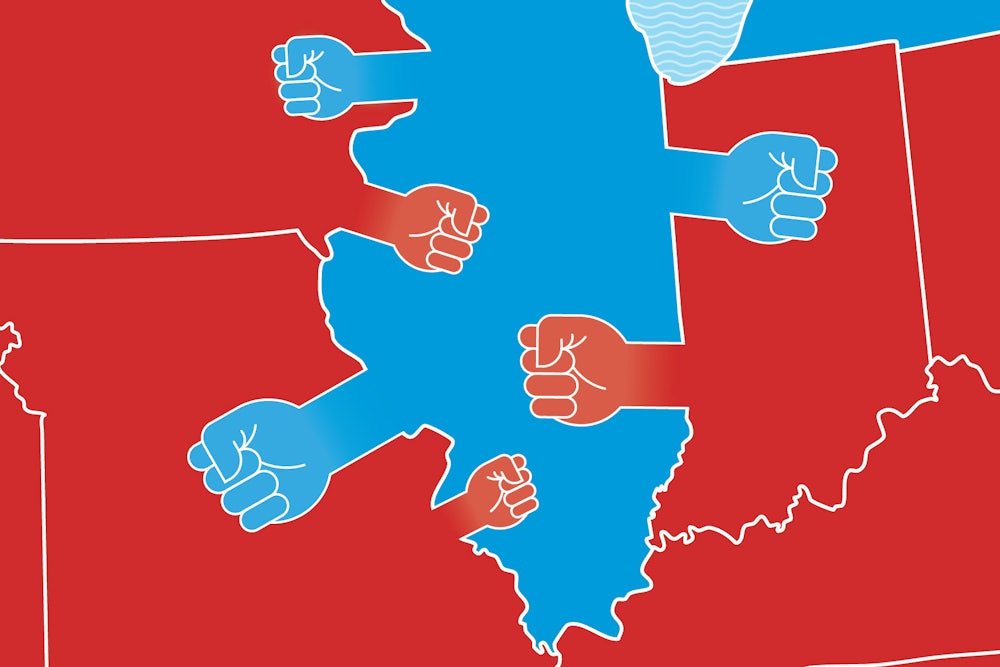Soon after the Supreme Court overturned Roe v. Wade, a group of far-right Texas state legislators accused the partners of one of the largest law firms in the country of committing felonies for reimbursing abortion travel expenses. A letter from the Texas Freedom Caucus alleged that the 150-year-old firm had reimbursed employees who traveled to other states for abortions or, as the caucus saw it, left Texas to “murder their unborn children.” Having struck the requisite unhinged tone, the caucus went on to offer a sneak preview of the anti-abortion agenda it has planned for the next legislative session. Its members hope to make it a felony for any Texas employer to pay for any abortion-related expenses. They also plan to let anyone sue anyone else who helps a Texas resident get an abortion, “regardless of where the abortion occurs, and regardless of the law in the jurisdiction.”
Most Montana abortion clinics now refuse to give pill abortions to patients from states with so-called trigger laws (which automatically banned abortion after the Dobbs decision) that could expose providers to civil or criminal liability for offering abortion pills to a trigger state resident seeking care in Montana. Last year, a Missouri state legislator proposed anti-abortion legislation that would have applied in cases not only where Missouri residents traveled out of state for abortions, but also when a woman had sex in Missouri that might have caused her pregnancy (it has not—yet—become law).
All of this should serve as a window into the aspirations of anti-choice legislators and a warning to the entire country. Now that the Dobbs decision has eliminated the constitutional right to abortion, anti-choice zealots are not satisfied with prohibiting it within their borders. They want to choke off abortion access nationwide. Not only states and cities, but also corporations, unions, and nonprofits, are all struggling to adjust to the shifting legal landscape and to protect their people from the incursions of abortion-hostile states.
Even states that criminalize abortion generally exempt the pregnant person from prosecution, but that taboo is unlikely to last, now that Roe no longer presents an obstacle to such prosecutions. Anti-choicers are obsessed with the idea of women circumventing their bans, whether by leaving the state or by obtaining abortion pills through the mail. Pregnant people may already be at risk of prosecution in some states because it’s an open question as to whether general-purpose criminal statutes like murder or child endangerment can be used to prosecute women for ending their own pregnancies. If states start passing so-called fetal personhood bills, which imbue fertilized eggs with full legal rights, it becomes difficult to imagine how the taboo against criminalizing the pregnant person for abortion can be sustained.
The end of Roe is pure chaos. A 50-year-old constitutional right has been reversed. Trying to take the full measure of the turmoil is like contemplating the vastness of outer space. No matter how big you think it is—it’s bigger.
On top of that, we live under constant surveillance. Smartphones and networked security cameras track our every move, electronic tolls record our travel. Our internet searches and text messages hold our deepest secrets. All this is evidence that could be used against anyone who helps a woman from an abortion-prohibition state access a legal abortion in another jurisdiction. “What we’re in the middle of is a massive intimidation effort by state governments to ensure that no actor, whether that’s an individual person like myself or an institution like a law firm, is actually helping anybody get an abortion,” said Tracy Weitz, a professor of sociology at American University and the director of the Center for Health, Risk, and Society.
Meanwhile, the anti-choicers know they’re up against a nation of would-be helpers. Overall, 72 percent of U.S. adults are willing to help a friend or family member who needs an abortion, according to a recent paper analyzing pre-Dobbs data from the long-running General Social Survey. More than 40 percent of those morally opposed to abortion say they would help make practical arrangements for someone they care about to terminate a pregnancy, and more than 20 percent of morally opposed respondents said they would even help pay for abortion-related expenses. “[The reason] red states are going so hard [with] this intimidation is they recognize that even for people who are against abortion, your gut instinct is to help someone in need,” Weitz said. “They want to shut that down, and they want to shut it quickly.”
The red states have declared war not only on abortion rights and women’s equality, but also on the bedrock principles that allow states to co-exist in a functional federal union. They have set us on a course of rancor and division, of escalating provocation and reprisal. Blue states have no choice but to act decisively to protect our rights and our people. Red states want a culture war? Let’s give ’em one.
Returning abortion to the states means calling the question at every level of society and in every center of power. From the biggest U.S. state to the scrappiest union local, from the tiny abortion fund to the massive hospital system. Every kind of power must be brought to bear: legal, economic, and cultural.
Blue states have already started to overhaul their abortion infrastructure to accommodate an influx of new patients from red states. Eliminating unnecessary restrictions on abortion care in blue states is a first step to ramping up capacity. For example, some states still have outdated laws that restrict abortion care to doctors, despite years of clinical experience that have shown that other health professionals—like nurse practitioners, nurses, and midwives—can safely manage many abortions. Eliminating those regulations would increase capacity.
In addition to funding abortion clinics directly, states could follow California’s lead in increasing Medicaid insurance reimbursement for abortion procedures so that more providers can afford to offer this care. Another important part of the capacity overhaul is protecting providers from harassment and abuse, both homegrown and from out of state. New York Governor Kathy Hochul recently signed legislation that protects providers from losing their malpractice insurance or having to pay higher premiums if they are sued under a bounty law. The governor recently announced millions in grants to increase security for abortion providers. New York now allows abortion providers, their families, and even clinic volunteers to enroll in the same address protection program that serves victims of domestic violence and human trafficking.
Blue states must also act to stymie red states seeking to impose their laws beyond their borders. According to David S. Cohen, a professor of law at Drexel University in Philadelphia and an expert on abortion law, four states have already passed legislation forbidding state employees from cooperating with investigations into legal abortions on their own soil. In general, states help one another enforce their respective laws beyond their borders, a tradition known as comity. If a suspect wanted for bank robbery in Texas flees to Connecticut, the Connecticut police will happily arrest him in Connecticut, where Texas agents cannot pursue him because they lack jurisdiction. However, thanks to Connecticut’s shield law, Connecticut officers will not investigate or arrest Connecticut residents who help Texans get abortions. It’s critical that states have these self-protective laws in place before the red states progress to attempting to enforce their criminal laws beyond their borders. Without a law to exempt state employees from the normal rules of comity, New Mexico police officers might be obligated to drag a Texan out of a New Mexico abortion clinic, if Texas were to pass a law that criminalizes traveling to another state to obtain an abortion.
This kind of blue-state self-assertion is not without its risks, however. Erosion of comity between the states will have far-reaching and unpredictable consequences for our federalist system of government.
The current situation, with blue states scrambling to protect their residents and red states scheming to impose their will beyond their borders, reminds many legal scholars of the conflict that the nation faced over slavery in the run-up to the Civil War. The fiction was that each state was free to choose within its borders, but the reality was that slave states demanded that free states cooperate in their efforts to apprehend escaped slaves. The big difference is that women are citizens and there’s no constitutional proscription on abortion as there was a constitutional recognition of slavery.
There is no guarantee that today’s Supreme Court will uphold states’ rights to refuse comity to protect reproductive rights. It’s not clear that red states have the power to enforce their laws across their borders, but they are already acting as if they do. Blue states must assert aggressively that they have the power to protect their people.
Connecticut, under Democratic Governor Ned Lamont, is leading the nation with its shield law, designed to neutralize the bounty laws. A person in the Nutmeg State who is sued under a bounty law is given the right to countersue. Under the new law, Connecticut residents who are sued by bounty hunters for receiving or providing reproductive health care will be eligible to recover “money damages treble the amount of any money damages award contained in the judgment entered in another state.”
If the overtures of the Freedom Caucus are any indication, anti-choice legislators in Texas are preparing to expand their reach from civil liability to attempted criminal prosecution across state lines. Most legal experts agree that the right to travel from one state to another is one of the unenumerated rights guaranteed under the Tenth Amendment. However, many pro-choice legal experts are skeptical that the current Supreme Court will uphold it where abortion is concerned.
Heather Shumaker, the director of state abortion access at the National Women’s Law Center, cautioned that, despite Justice Brett Kavanaugh’s reassurance in his concurrence that the right to travel would not be infringed, it’s not a foregone conclusion that the court will protect that right. “I don’t feel like anything is off the table with this court or with anti-abortion extremists in this moment,” Shumaker said. “I think that they’re looking at every possible avenue to prevent people from getting the care that they need.”
A lot of what blue states can do to increase abortion access will happen in cooperation with the federal government. The Biden administration has eased restrictions on the abortion pill mifepristone, finally allowing patients to receive the pills in the mail rather than picking them up at a health care facility. Now the blue states have an opportunity to protect providers in their states who are willing to offer telehealth care and to mail abortion pills to patients in states where abortion is prohibited.
In the latest draft of a law review article on the interstate battle royal now unfolding over abortion rights, Cohen notes that, while the Constitution forces states to return fugitives, it doesn’t force states to extradite lawbreakers who don’t flee. If an Illinois abortion provider presides over a telehealth abortion that is legal in Illinois but never sets foot in Kentucky, then Illinois does not have to extradite that provider to Kentucky. Some shield laws already restrict extradition. Some liberal governors have signed executive orders saying they won’t extradite, but these orders only affect executive branch employees. Shield laws can be much broader in their protections.
“Probably the most creative, although legally risky thing that states could do is say that every state says that the location of care for telehealth is where the provider is,” Cohen said. That would mean that a California nurse practitioner who coordinates a pill abortion for a patient in Alabama is acting legally in the eyes of her home state (though still illegally in the eyes of Alabama). “That’s where the legal risk comes in, because they would then be subject to prosecution in Alabama, but they would be safe in their own state,” Cohen said. The downside is that a provider wanted in Texas might not safely be able to leave their blue state for fear of prosecution. This raises the potential scenario of abortion providers from blue states never being able to travel in any red state, if red states band together to vow to arrest such providers.
Business and labor have roles to play in safeguarding abortion rights as well. After the fall of Roe, many nationally known firms announced abortion travel benefits for employees in states where abortion is illegal. Dick’s Sporting Goods announced that it would reimburse employees for up to $4,000 for travel to the nearest place they could obtain a legal abortion. Some, like the law firm Sidley Austin, were offering these benefits even before Dobbs. These programs aren’t just for good press—there’s an important business calculus behind them. In the short term, lack of reproductive rights will become a major obstacle to recruiting and retaining talent, a source of expensive job turnover, and a drain on morale. And over the long run, employers may find the end of legal abortion in Sun Belt states has a negative effect on the overall business climate.
Corporate America is engaged in what Commerce Secretary Gina Raimondo calls “a war for talent”—a struggle to attract qualified employees to ensure a competitive edge. Criminalizing abortion, along with other red-state social policies, such as marginalizing LGBTQ youth in school and attacking academic standards in the name of fighting imaginary “critical race theory” in the classroom, are only going to reduce the supply of talent that keeps the Sun Belt economy humming. People with options are less willing to live as second-class citizens or raise their daughters as second-class citizens. The Dobbs decision is also putting even nonpregnant women’s health in jeopardy. We have seen health insurers and pharmacies crack down on vital medications for conditions like rheumatoid arthritis on the grounds that they could be used to induce an abortion or simply because they might cause harm to a fetus. There are real questions about whether in vitro fertilization will be legal in some states, especially if they adopt additional laws declaring an embryo to have all the legal rights of a person. All state bans contain exceptions for the life of the pregnant person, but it’s not clear how close to death a woman has to be to merit an emergency abortion. Which means that abortion bans pose a threat to any woman with a high-risk pregnancy. There have already been cases of women having to travel to obtain lifesaving care because their doctors didn’t think they were close enough to death to qualify for a termination. Imagine that scenario repeating itself in states where helping a woman travel for an abortion is now a felony.
Tracy Weitz welcomes these assistance programs but urges employers to target the help where it is most needed. Many employers touting their abortion travel benefits do not cover their low-wage workers who don’t have fringe benefits and, critically, their contract workers. Since 75 percent of abortion-seekers are low-income, it’s very important to make sure that the benefits find their way to those most in need of help.
Red states are doing their best to intimidate corporations out of helping their employees access abortions. In the opinion of some state legislators, Texas corporations that pay for abortion travel are already committing a felony under a 1970s-era statute that the Texas legislature claims is still in force. It remains to be seen whether prosecutors agree with that analysis, but more legislation is surely coming to harass corporations that support the abortion rights of their workforce.
It’s not just pro-choice scholars and businesspeople who anticipate abortion bans accelerating brain drain from red states. Missouri’s GOP Senator Josh Hawley gleefully predicted that the fall of Roe would accelerate the outflow of liberals from red states, making them even redder. These liberals would disproportionately relocate to big blue cities where the Electoral College system dilutes their votes even further. Hawley predicted a political realignment in red America where social conservatives become so powerful that they won’t even have to tolerate fiscal conservatives in their coalition.
“Corporations are going to have to decide: Which side of this are they on? Are they going to bow to the intimidation, or are they going to step forward for their employees and help people get out of state and take on the lawsuits,” said Tracy Weitz of American University.
Finally, there is a broader front than abortion rights in this battle—it’s the economic leverage that blue states potentially have over red states. There has been a lot of talk about economic sanctions over abortion prohibition. Various local governments have floated the idea of banning official government travel to abortion-prohibition jurisdictions. In June, Montgomery County, Maryland, froze official travel to 25 states that restrict reproductive health care. There is precedent for this. California banned taxpayer-funded travel to Texas over a 2017 law that allowed discrimination against LGBTQ people. The good news is that the Supreme Court refused to hear Texas’s challenge to the ban. The bad news is that the ban does not appear to have dampened Texas’s zeal for discriminating against gay and trans residents.
Blue-state governors are already working the abortion angle to lure corporations away from the Sun Belt. California Governor Gavin Newsom proposed tax credits and other incentives to entice employers to relocate. Illinois Governor J.B. Pritzker sent letters to executives of firms based in Texas, asking them if they really want to stay in “a state that strips its residents of their dignity” and noting that most workers don’t want to live under an abortion ban.
No tool should be beyond consideration here, in the face of the America these people are trying to create. But in the end, what red states do to themselves may be far more economically painful than anything blue states could dream up. Abortion bans already cost the U.S. economy billions of dollars by decreasing women’s labor force participation and increasing poverty and debt. A pre-Dobbs study by the Institute for Women’s Policy Research found that abortion restrictions cost the country $105 billion a year. The study projected that reversing all abortion bans would add nearly half a percentage point to the national GDP. Since different states have very different laws, red states disproportionately bear that cost.
The country is already facing a labor shortage. Forcing more women in the prime of their lives out of the workforce with unplanned pregnancies is only going to exacerbate the problem. “Reproductive health is on everybody’s mind. That’s going to hurt the economy,” Gina Raimondo told Meet the Press. “You talk about the single-biggest issue, look at workforce participation of women without a college degree.”
Sun Belt governors have billed their states as freewheeling business environments. However, with social conservatives ascendant, Sun Belt leaders are feeling free to threaten and even punish corporations that criticize their policies. In April, Florida repealed a law that had given the Disney corporation self-rule over huge tracts of land surrounding Disney World and had allowed the company to issue tax-free municipal bonds. The falling-out happened after CEO Bob Chapek spoke against Florida’s “Don’t Say Gay” law. Disney, through its Reedy Creek Improvement District, has issued $1 billion in bonds, which local governments will now have to service. That’s $580 per person for the residents of the two-county area where the Disney zone used to be. Those citizens could also have to pay for public services that Disney used to cover.
Texas legislators threatened to drop Citigroup as a bond underwriter for the state of Texas for offering abortion travel benefits to its employees. State Representative Briscoe Cain, a member of the Texas Freedom Caucus, sent a cease-and-desist letter to Citigroup and to the leaders of some major nonprofits that have raised money for abortion travel. Cain also threatened to introduce legislation to stop municipalities from doing business with any firm that provides abortion travel benefits.
Corporations are willing to put up with a lot in exchange for low taxes, lax regulation, and warm weather. But the possibility that Texas might charge senior management with felonies over employee fringe benefits is sure to chill the climate for business at least a little. At the minimum, the willingness of states like Florida, Texas, and Georgia to inflict high-dollar punishments on dissenting companies creates uncertainty that is unattractive to business.
Organized labor is also grappling with the fallout of Dobbs. Many international unions reiterated their support for a woman’s right to choose, but labor’s strategy for navigating the real-world implications for its members is still coming together. Ideally, unions want to address this issue through collective bargaining to negotiate for abortion travel benefits and perhaps other concessions to help their members. But each collective bargaining agreement has to be examined separately in light of rapidly changing local and state laws.
“Everything is in chaos,” said Tina Morrison, a member of the international executive board of the American Federation of Musicians as well as a local AFM union official in Washington state. Morrison said that the Dobbs decision has had major impacts across the AFL-CIO, the federation to which the AFM belongs. She said the decision was already affecting the members of her local, which straddles pro-choice Washington state and anti-choice Idaho. Some of the members of her local travel from state to state. Morrison said she was hopeful that the National Labor Relations Board would issue guidance to help the nation’s unions stay on top of all the changes that are coming their way.
A 50-year-old constitutional right has evaporated overnight. The states will soon be split about 50–50 between abortion rights and abortion prohibition. The fight to come will strain the legitimacy of our institutions to the breaking point, test our faith in the rule of law, and tear the country apart. As tragic and as ugly as the struggle will be, it’s a fight blue states can’t shy away from.
This article has been updated.






